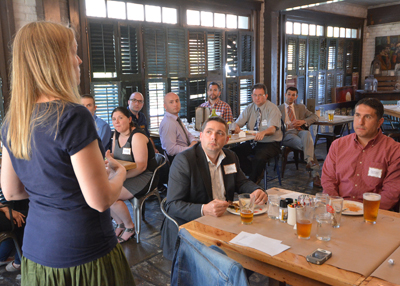May 2015
Collaboration. To co-labor. To work together. Because the word collaboration captures the very essence of unionism, it's fitting that college-wide new member coordinator Sarah Gutowski highlighted the smart collaborations between and among a variety of FA members in the inaugural FA new member discussion series. Gutowski chose to center the series on helping new members shape their career paths at SCCC with purpose, efficiency and confidence. The series began in September with three junior faculty sharing some hindsight on their first year at SCCC. Among the many smart suggestions shared by panelists Misty Curreli (Sociology, Eastern), Jason Ramírez (Theater Arts, Grant) and Nick Giordano (Political Science, Ammerman) came suggestions about how to organize one's workday so as not to feel burned out, how to resist making assumptions about students and how to keep current with your discipline. Later in the fall, "The Long View" panelists advised newer faculty on how to plan your career at SCCC. Bill Burns (English, Ammerman) suggested that faculty look at their personal, college and professional geographies and analyze how best to align them when determining where to put their energies. Because Burns loves horror and science fiction films, for example, he has developed a special topics course on them, created a student sci fi club and does Professors on Wheels presentations about them. Gutowski walked participants through the process of writing a letter to your ten-year self: where do you want to be in ten years? Identify those goals and establish a schedule by which to work toward them.
This spring the new member discussion series delighted a packed room by spotlighting several unique faculty collaborations. On the Eastern campus, for example, Joe Napolitano (Biology) and Meredith Starr (Visual Arts) worked together so that Starr's Drawing II students had access to the insects used by entomologist Napolitano in his classes so they could draw them. The results were stunning both in terms of student enthusiasm and their resulting artistic efforts. On the Grant campus, Sue DeMasi (Library) collaborated with Alyssa Kauffman (Communications) to bring to life a play, which DeMasi had written during a recent sabbatical, that relies on oral histories of the Great Depression. Gutowski's new member initiatives are invaluable to an academic union, as they keep us mindful that our members truly are at the heart of why the FA exists. The new member program serves an inherently useful, incredibly practical service for our membership. "As a writer," Gutowski says, "I know that the habit of keeping process notes—the act of reflecting on the creation of a draft—can be essential to an important revision and even prompt new and different work from the writer. The act of mentoring is very similar; as a mentor reflects on her acclimation to the college community or her own progress toward promotion, the mentor may gain insight that benefits not only her mentee but also her own future endeavors at the institution. The mentee, in turn, gains instant community and varying perspectives, not just in his department but also across disciplines and from people with varying interests, job titles and levels of experience." "Our faculty are involved in so many interesting and vibrant projects at the college—why shouldn’t we celebrate them? Why shouldn’t we collaborate more in these relatively informal discussion sessions?" she asks. "It’s really easy to become jaded or bitter when it’s the middle of the semester and we’re frustrated and feeling alone, buried under stacks of grading or committee work. Why not share the load in interesting ways, like collaborative teaching or interactive cross-discipline classrooms? Why not share with our colleagues ways in which we can do this and make teaching more rewarding for everyone involved? Why not help our colleagues avoid mistakes we made or encourage them to share in our successful practices?
|



 The FA’s new member blog, The Undercurrent, is looking for faculty, new and not-so-new, to help sustain and diversify the (should be) weekly blog.
The FA’s new member blog, The Undercurrent, is looking for faculty, new and not-so-new, to help sustain and diversify the (should be) weekly blog.